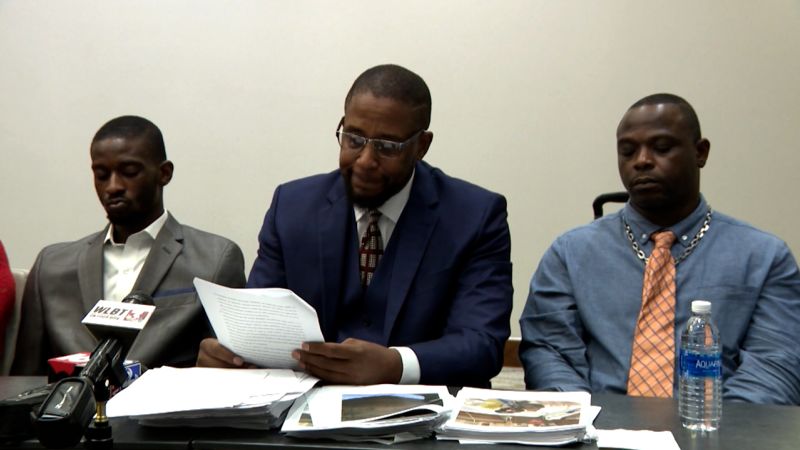CNN
—
A second Mississippi law enforcement department says that one of its officers was “implicated” in an incident of alleged torture, shooting and attempted sexual assault of two men in police control.
Richland Police Department says Officer Joshua Hartfield, who was off duty at the time of the incident, has resigned, according to an open letter from the chief of the department.
“Upon receiving the information regarding the allegations against Hartfield, immediate action was taken in line with our strict standards of responsibility and accountability. Hartfield was placed on administrative leave, subjected to disciplinary action, and subsequently tendered his resignation,” Chief Nick McLendon of the Richland Police Department said.
“If proven factual, this incident taints the respected badge,” McLendon added.
CNN has reached out to Hartfield for comment and he has not responded.
The incident occurred on January 24 in Braxton, Mississippi, just southeast of Jackson. It came to light last month after two men, Michael Jenkins and Eddie Parker, filed a federal lawsuit. Hartfield was not named in the lawsuit, which only identifies Rankin County Sheriff’s deputies. It’s not clear how Hartfield was possibly involved in the incident or what his role might have been.
The two men, who are Black, say that six White law enforcement officers entered the home they were in and tortured them for nearly two hours, culminating with Jenkins being shot in the mouth.
Rankin County Sheriff Bryan Bailey said at a news conference last week that some of his department’s deputies were no longer with the department, although he didn’t confirm the number or their names.
Bailey said that initially “deputies involved with this incident were placed on administrative leave pending final investigative findings.”
“Due to recent developments, including findings during our internal investigation, those deputies that were still employed by this department have all been terminated,” Bailey added.
“Black Lawyers for Justice commends Chief McClendon for taking the first step toward justice in his well-written letter. The next step in the fight for justice for the victims is the criminal prosecution of the rogue officers involved in the actions,” the lead attorney for the plaintiffs, Malik Zuku Shabazz, told CNN affiliate WLBT.
In the lawsuit filed June 12 in US District Court in Mississippi, Jenkins and Parker allege deputies handcuffed, kicked, waterboarded, repeatedly used Tasers and attempted to sexually assault them during the January incident. The lawsuit states a deputy placed a gun in Jenkins’ mouth and shot him, lacerating his tongue and breaking his jaw.
Three Rankin County Sheriff’s deputies – Hunter Elward, Brett McAlpin and Christian Dedmon – are named as defendants, with three more defendants being named as John Does. The lawsuit also names Bailey and Rankin County as defendants.
CNN has reached out to Elward, McAlpin and Dedmon but has not received a response.
The lawsuit filed last month describes the John Does as Rankin County deputies who participated in the alleged torture but whose names were unknown to the plaintiffs.
“We believe Hartfield is one of the John Doe deputies,” Shabazz told CNN in a phone interview Wednesday.
During the incident, the lawsuit alleges, the deputies repeatedly directed racial slurs at the men and accused them of “dating White women.”
Jenkins and Parker claim the deputies, “in their repeated use of racial slurs in the course of their violent acts, were oppressive and hateful against their African-American victims. Defendants were motivated on the basis of race and the color of the skin of the persons they assaulted,” the lawsuit states.
Attorneys for both Jenkins and Parker say the pair “were in complete custody and control” of deputies during the incident.
“Throughout the nearly two-hour ordeal, the six deputies would punch and beat two handcuffed men at will, hurting and humiliating both Jenkins and Parker. Deputies also repeatedly and gratuitously kicked the men as if they were animals while they lay subdued and handcuffed,” the lawsuit alleges.
The deputies used their Tasers on the men, and “included multiple drive-stuns into the bodies of both,” the lawsuit states. Drive-stuns are when a Taser makes direct contact with a person’s body.
Jenkins and Parker were waterboarded by the deputies, “continuously pouring the liquids on their faces while both men were handcuffed and forced on their backs,” according to the lawsuit. During the alleged waterboarding the deputies continued to use racial slurs.
The deputies then, “attempted to use a dildo or sexual device against Mr. Jenkins and Mr. Parker in the course of this torture session,” the lawsuit says. In their lawsuit, the men say photos from the scene show such a device.
The lawsuit goes on to say deputies threw eggs at the pair, and “in an effort to sanitize their acts” forced both men to disrobe and shower together.
“To shower together was designed to humiliate and intimidate them and also to conceal evidence of the eggs being hurled and the Plaintiff’s defecating on themselves after the attempted sexual assault against them,” the lawsuit says.
“At the crescendo of this nearly two-hour torture session,” according to the lawsuit, “Deputy Hunter Elward shoved his service weapon inside Michael Jenkins’s mouth while he was handcuffed.”
The victims allege a deputy then “spoke angrily,” and fired his weapon inside Jenkins’ mouth, shattering his jaw and severely lacerating his tongue. The lawsuit says that Jenkins nearly died from his injuries.
“His tongue was severed; it was holding on by a sliver when the bullet went through,” Jenkins’ mother, Mary Jenkins, said during a news conference.
The deputies had turned off their body cameras during the incident and did not have warrants, the lawsuit alleges.
Since the lawsuit has been filed, attorneys for the victims say they have developed more information.
This case is “the most serious and outrageous case of police brutality,” attorney Shabazz said. “Criminal charges are warranted. We expect criminal charges soon,” he added.
The incident is under federal and state investigation.
McLendon said his department would continue to cooperate in the investigations.
The FBI Jackson Field Office, the US Department of Justice’s Civil Rights Division, and the US Attorney’s Office for the Southern District of Mississippi have opened a civil rights investigation into the incident.
“The FBI will conduct the investigation in a fair, thorough, and impartial manner. As this is an ongoing investigation, we are not able to comment further at this time,” Aryele N. Bradford, a spokeswoman for the US Department of Justice, told CNN in an emailed statement.
Shabazz said his clients have been interviewed by federal investigators.
“This is being taken seriously at the highest level of the Department of Justice,” Shabazz added.
Mississippi Bureau of Investigation (MBI) conducted an independent investigation of the incident. CNN has asked the MBI for details of the investigation but has not received a response.
Jenkins and Parker’s attorney said that they have also been formally interviewed by MBI as well.
A release from the Mississippi Department of Public Safety the day after the incident gave no hint of what the victims would later allege, saying the MBI was investigating an “officer involved shooting.”
“Rankin County Sheriff’s Department deputies were conducting a narcotics investigation when they encountered a subject that displayed a gun towards the deputies. The subjects were transported to a nearby hospital. The officer received no injuries,” it said in the January 25 release.
In their lawsuit, Jenkins and Parker deny possessing or displaying any weapon.
Both Jenkins and Parker continue to recover from the events, both physically and mentally, Shabazz said.























/cdn.vox-cdn.com/uploads/chorus_asset/file/25789444/1258459915.jpg)

/cdn.vox-cdn.com/uploads/chorus_asset/file/25546252/STK169_Mark_Zuckerburg_CVIRGINIA_D.jpg)

/cdn.vox-cdn.com/uploads/chorus_asset/file/23951353/STK043_VRG_Illo_N_Barclay_3_Meta.jpg)
/cdn.vox-cdn.com/uploads/chorus_asset/file/24924653/236780_Google_AntiTrust_Trial_Custom_Art_CVirginia__0003_1.png)